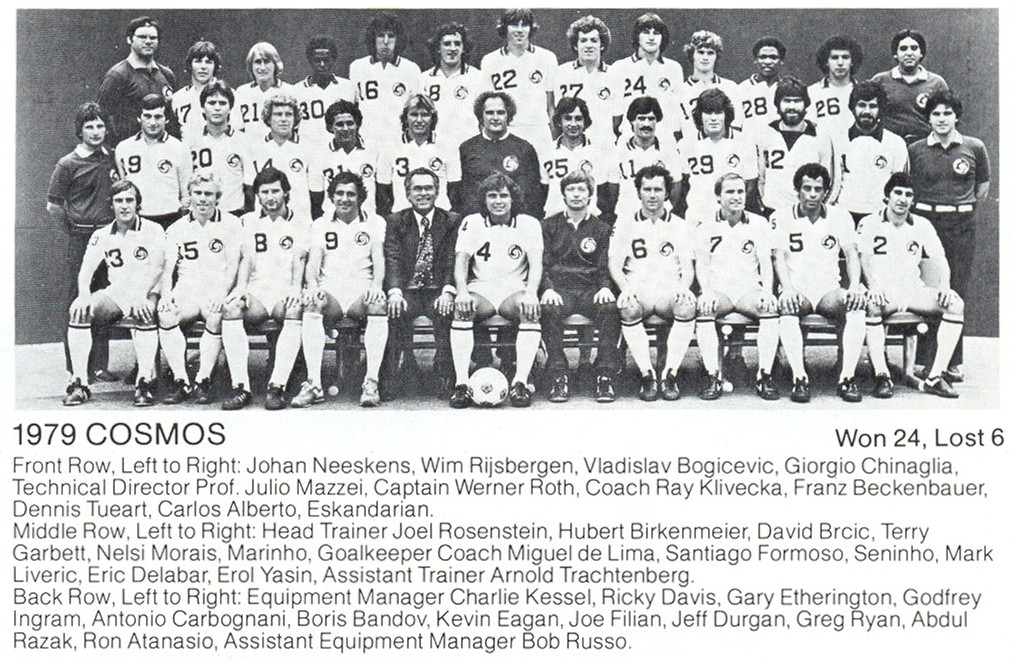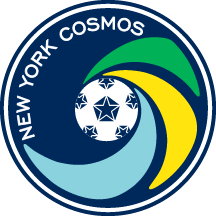News
Santiago Formoso in Conversation (Part III)

Santiago Formoso spent two seasons with the Cosmos, beginning with the 1977 postseason world tour, scoring twice in 46 league appearances from his left back position. The speedy, stylish and notoriously sleepy-headed left back was a product of the local soccer scene, graduating from Kearny High School in 1973 before playing at the University of Pennsylvania and beginning his professional career with the Hartford Bicentennials in 1976. Few knew the US National Team standout was a native of Vigo, Spain in the Galicia region of northwest Spain.
The documentary film, Alén do Cosmos (written and directed by Pedro Pablo Alonso) tells his story. After a premiere in Vigo last year and screenings at the Thinking Football Festival in Bilbao and the Off Side Festival in Barcelona, Alén do Cosmos makes its New York debut at the Galician Cinema and Food Festival at 6:00pm this Thursday, June 29th, at the Cervantes Institute, 211 E. 48th St. in Manhattan.
Santiago recently took time to discuss the film and his career with Club Historian Dr. David Kilpatrick.
Read Part I here and Part II here.
DK: What are your strongest memories or any unknown stories maybe you could share with us? That children can read.
SF: I can’t. The best stories were off the field. But the on the field story was just amazing, you know, you just went out with a smile on your face on the field just because of who your teammates are. I had played on teams where you look at your teammate and say, “Oh my God, look at this idiot next to me. He can’t trap a ball.” I try and play a wall pass with him and he returns to me a brick. And now I’m worried, “Do I live up to this standard?” And to go on the field with them, with Carlos Alberto, Pino Wilson, Marinho, Beckenbauer, Neeskens. “What the hell am I doing here?” And to be picked to play with them, to actually play, I pinched myself every day. I used to love going to practices just to play. I never thought that I wasn’t going to have a good day, that I wasn’t good enough to play with them. I always thought that I fit right in, because that was my game.
DK: So you had that storybook game-winning goal on Kearny Day of all days [3-2 win over the Vancouver Whitecaps at Giants Stadium on June 4, 1978]. Was that your greatest memory with the club?
SF: No, it was a good memory. But I was not Giorgio Chinaglia when it came to scoring goals. The greatest memory would be playing at Madrid, or playing against the World All-Stars, or playing against Argentina when they just got back from winning the World Cup in ’78. There’s just way too many. Playing Bayern Munich in Germany, even though we got spanked. That’s what I remember. They decided to bring over all these guest players and they put them on in the first game against Bayer Munich and, bang, they destroyed them, and Eddie [Firmani] had to go back to the old lineup and try to fix it. It was too late, we were already down 5-nothing [in the eventual 7-1 loss]. Going to China was a great, unbelievable experience. There’s just too many. Those two years that I was there were like two decades.
DK: This film gives us a great opportunity in Cosmos Country to learn your story. How did the film project come about?
SF: The producer is a sports reporter and he was talking to one of his friends in Spain, and they were talking about the ‘70s and about the Cosmos. He was a young kid and he heard of the New York Cosmos and the friend said, “They were the best team of all time. Did you know they had a Gallego in the team?” Now, he has a brother who is a professor at Columbia, tenured here for a few years now. So he calls his brother and says, “You’ve gotta track this guy down.” So the brother started calling the ethnic clubs, and he called one in Newark and the guy said, “Santi? He’s here every day playing cards.” He got in touch with me and he said, “Listen, this is a story that needs to be told” and we just took it from there. And here we are in the Big Apple.
DK: So in some ways this brings you full circle. You talked a little bit about what it was like on the pitch but off the pitch you guys were right there with the movie stars and the rock stars.
SF: We were the toast of the town. We were bigger than the Knicks and the Jets and all that. We were it. We were the fad. We were a fad, let’s put it that way. So therefore between ’76 and ’80, the Cosmos owned the town. And I happened to be in the middle of it, luckily enough.
DK: Must have been a lot of fun.
SF: Oh yeah. And a lot of it is censored.
DK: To protect the innocent.
SF: It has to remain untold. I would love to tell some stories, but I would have to run it by my teammates first to see if they approve.
DK: Oh I’ve heard a few…
SF: Because everybody’s got children and grandchildren. You don’t want to put their names out there. There’s no need to know.
DK: You guys had a lot of fun, didn’t you?
SF: Yeah, we did.
DK: How does it feel for you with the club back playing again after the years away?
SF: The name is still alive. It makes me very proud.
DK: Well, we’re going to have a lot of fun Thursday night at the film’s New York premiere.
SF: I hope so.
DK: Thanks so much for taking the time to talk.
SF: Anytime. Anytime you want some info. So long as I don’t have to spill the beans too much, I’m good.
DK: I have heard some of the beans and oh my God, what a lot of fun.
SF: Oh yeah, they are incredible beans.


